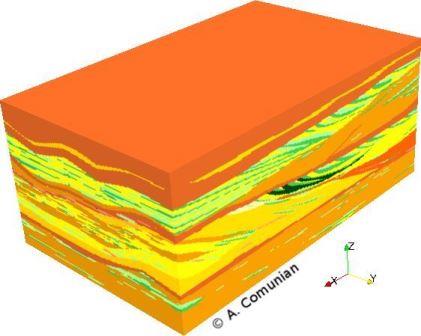Current Research Projects
- Ensemble Project
The state of the art in modeling groundwater systems is related to developments in various fields such as geology, physics, geophysics, hydrogeology, or mathematics. Too often, this research is pursued independently by different teams and not integrated around a unique vision. The aim of the ENSEMBLE project supported by the Swiss National Science Foundation is to integrate the latest developments in these fields to increase our ability to understand and predict complex hydrological systems.
The Stochastic Hydrogeology Group coordinates the ENSEMBLE project. Its aim is to integrate the latest developments in the fields of alluvial geology, geostatistics, geophysics, numerical modeling, physics and mathematics to increase our ability to understand and predict complex hydrological systems. The project involve 6 universities in Switzerland and the US.
Collaborators: Prof Philippe Renard, Dr. Julien Straubhaar, Guillaume Pirot (PhD student)
More information : http://www.ensemble-modeling.org
- Xibalba Project
In this project, the aim is to understand groundwater flow and karst network formations in the region of Tulum, Mexico. This project is done in close collaboration with the Austrian Geological Survey in Vienna. The research questions are related to the processes that lead to the formation of one of the largest submarine karst system in the world.
Collaborators: Prof Philippe Renard, Axayacati Maqueda (PhD student), Martin Hendrick (PhD student)
More information : http://xibalba.geophysik.at/Project.html
- Rainbow Project
Multiple point statistics, and especially the direct sampling technique can be used to model not only geological heterogeneity but also climatic variables. In this project, we test how the direct sampling can perform for those type of variables. This seems to be specially interesting since it requires a minimum effort of statistical inference.
Collaborators: Prof Philippe Renard, Fabio Oriani (PhD student)
Collaborations
The stochastic research group actively collaborates with several institutions worldwide. Our most active current links are with:
- Fluid mechanic institute of Toulouse (IMFT): R. Ababou
- National Centre for Groundwater Research and Training (Australia): Flinders University (C. Simmons), and University of Sydney (G. Mariethoz, A. Comunian)
- Stanford University: Stanford Centre for Reservoir Forecasting : J. Caers
- Ecole de Géologie de Nancy: G. Caumon, P. Collon-Drouaillet
The stochastic research group has maintained a long standing collaboration with private companies. We are particularly thankfull to the following companies for their support:
- Ephesia Consult. Since 2006, we have been working closely with Ephesia Consult to develop multiple point statistics techniques.
- Total is supporting our research on multiple-point statistics.
- Schlumberger funded the PhD thesis of A. Borghi on the modeling of karstic systems.
- Paradigm is providing us with GOCAD modelling software for research and teaching purposes, free of charge. We are pleased that some of our code (Impala) is embedded in this software.



